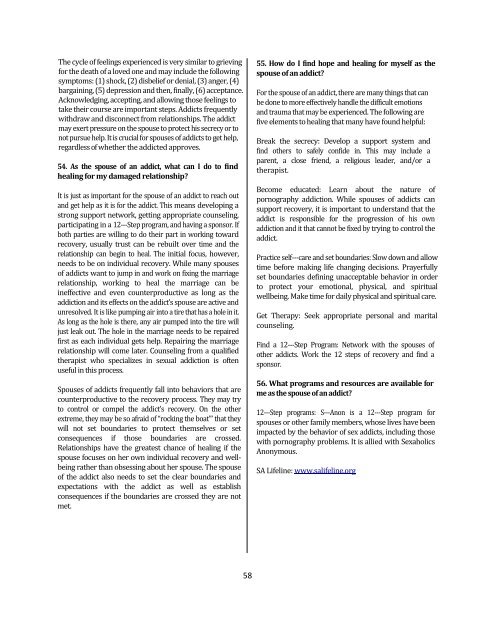Safety Net
Safety Net
Safety Net
You also want an ePaper? Increase the reach of your titles
YUMPU automatically turns print PDFs into web optimized ePapers that Google loves.
The cycle of feelings experienced is very similar to grieving<br />
for the death of a loved one and may include the following<br />
symptoms: (1) shock, (2) disbelief or denial, (3) anger, (4)<br />
bargaining, (5) depression and then, finally, (6) acceptance.<br />
Acknowledging, accepting, and allowing those feelings to<br />
take their course are important steps. Addicts frequently<br />
withdraw and disconnect from relationships. The addict<br />
may exert pressure on the spouse to protect his secrecy or to<br />
not pursue help. It is crucial for spouses of addicts to get help,<br />
regardless of whether the addicted approves.<br />
54. As the spouse of an addict, what can I do to find<br />
healing for my damaged relationship?<br />
It is just as important for the spouse of an addict to reach out<br />
and get help as it is for the addict. This means developing a<br />
strong support network, getting appropriate counseling,<br />
participating in a 12-Step program, and having a sponsor. If<br />
both parties are willing to do their part in working toward<br />
recovery, usually trust can be rebuilt over time and the<br />
relationship can begin to heal. The initial focus, however,<br />
needs to be on individual recovery. While many spouses<br />
of addicts want to jump in and work on fixing the marriage<br />
relationship, working to heal the marriage can be<br />
ineffective and even counterproductive as long as the<br />
addiction and its effects on the addict’s spouse are active and<br />
unresolved. It is like pumping air into a tire that has a hole in it.<br />
As long as the hole is there, any air pumped into the tire will<br />
just leak out. The hole in the marriage needs to be repaired<br />
first as each individual gets help. Repairing the marriage<br />
relationship will come later. Counseling from a qualified<br />
therapist who specializes in sexual addiction is often<br />
useful in this process.<br />
Spouses of addicts frequently fall into behaviors that are<br />
counterproductive to the recovery process. They may try<br />
to control or compel the addict’s recovery. On the other<br />
extreme, they may be so afraid of “rocking the boat”’ that they<br />
will not set boundaries to protect themselves or set<br />
consequences if those boundaries are crossed.<br />
Relationships have the greatest chance of healing if the<br />
spouse focuses on her own individual recovery and wellbeing<br />
rather than obsessing about her spouse. The spouse<br />
of the addict also needs to set the clear boundaries and<br />
expectations with the addict as well as establish<br />
consequences if the boundaries are crossed they are not<br />
met.<br />
58<br />
55. How do I find hope and healing for myself as the<br />
spouse of an addict?<br />
For the spouse of an addict, there are many things that can<br />
be done to more effectively handle the difficult emotions<br />
and trauma that may be experienced. The following are<br />
five elements to healing that many have found helpful:<br />
Break the secrecy: Develop a support system and<br />
find others to safely confide in. This may include a<br />
parent, a close friend, a religious leader, and/or a<br />
therapist.<br />
Become educated: Learn about the nature of<br />
pornography addiction. While spouses of addicts can<br />
support recovery, it is important to understand that the<br />
addict is responsible for the progression of his own<br />
addiction and it that cannot be fixed by trying to control the<br />
addict.<br />
Practice self-care and set boundaries: Slow down and allow<br />
time before making life changing decisions. Prayerfully<br />
set boundaries defining unacceptable behavior in order<br />
to protect your emotional, physical, and spiritual<br />
wellbeing. Make time for daily physical and spiritual care.<br />
Get Therapy: Seek appropriate personal and marital<br />
counseling.<br />
Find a 12-Step Program: <strong>Net</strong>work with the spouses of<br />
other addicts. Work the 12 steps of recovery and find a<br />
sponsor.<br />
56. What programs and resources are available for<br />
me as the spouse of an addict?<br />
12-Step programs: S-Anon is a 12-Step program for<br />
spouses or other family members, whose lives have been<br />
impacted by the behavior of sex addicts, including those<br />
with pornography problems. It is allied with Sexaholics<br />
Anonymous.<br />
SA Lifeline: www.salifeline.org


